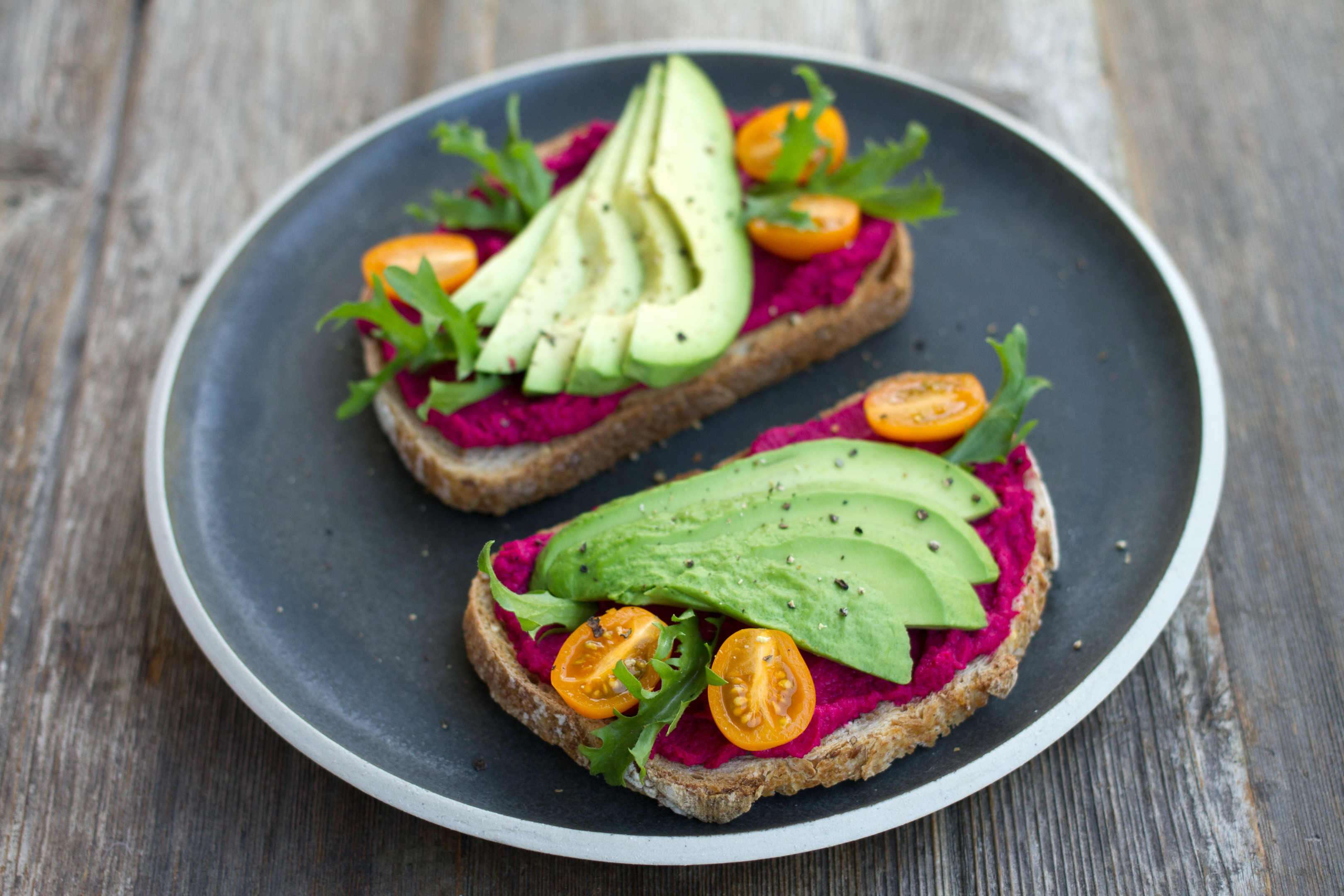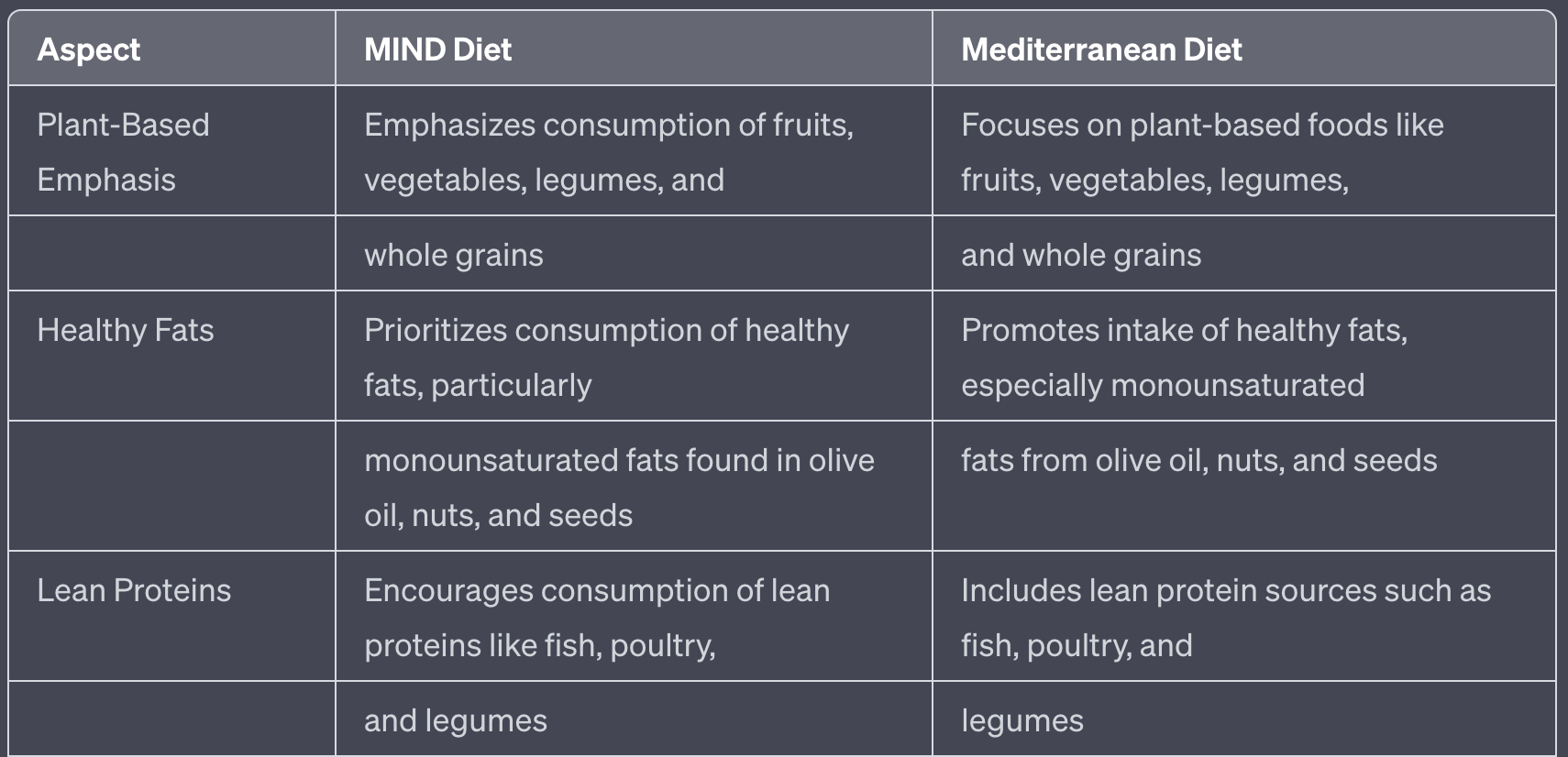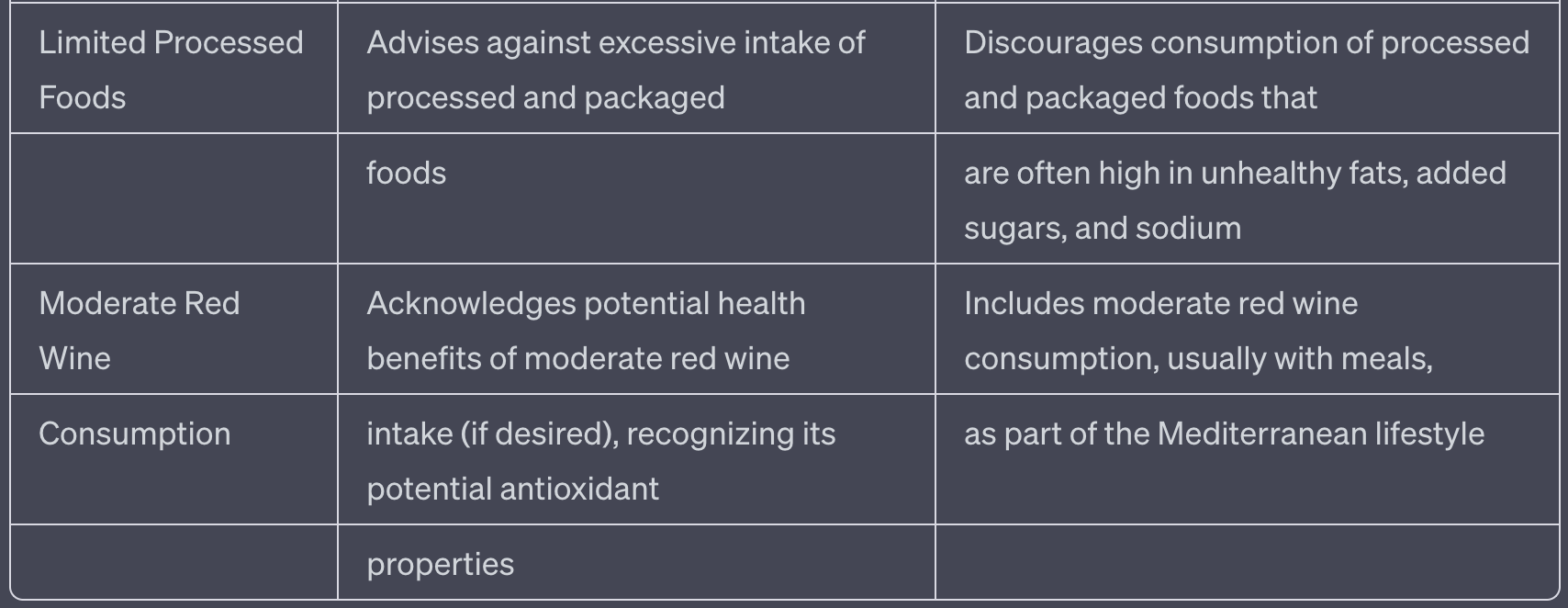The MIND diet, an acronym for “Mediterranean-DASH Diet Intervention for Neurodegenerative Delay,” has garnered attention as a dietary strategy aimed at maintaining brain health.

Combining the Mediterranean diet and DASH diet principles, the MIND diet plan focuses on specific foods with potential cognitive benefits.
In this analysis, we will delve deeper into the components of the MIND diet, its food guidelines, and its potential impact on brain health.
Table of Contents
- What is the MIND Diet?
- How does the MIND diet boost brain function?
- The Link Between the MIND Diet and Alzheimer’s Disease and Brain Function
- Top MIND Diet Food Groups
- 3 Things to Know Before Getting Started on the MIND Diet
- Can I Lose Weight on the MIND Diet?
- How Does the MIND Diet Work?
- Similarities between the MIND and Mediterranean Diets
- FAQ:
What is the MIND Diet?
The MIND diet is a nutritional regimen researchers at Rush University Medical Center developed. It is designed to reduce the risk of neurodegenerative diseases, particularly Alzheimer’s disease.

By incorporating foods considered beneficial for brain cells, the MIND diet aims to support neural function, delay cognitive decline, and improve brain health.
How does the MIND diet boost brain function?
The MIND diet incorporates nourishing, whole foods rich in vitamins, minerals, antioxidants, and essential fatty acids that support brain function.

By emphasizing foods with brain health benefits and avoiding those that may have a negative impact, the MIND diet aims to:
Support cognitive function
Slow age-related cognitive decline
Reduce the risk of neurodegenerative diseases such as Alzheimer’s.
The MIND diet is a brain-healthy eating plan that combines elements of the Mediterranean and DASH diets. It was developed by researchers at Rush University Medical Center in Chicago, Illinois, and was first published in 2009.
The Link Between the MIND Diet and Alzheimer’s Disease and Brain Function
The MIND diet is based on the idea that certain foods can help protect the brain from Alzheimer’s disease and other forms of dementia.
The diet emphasizes fruits, vegetables, whole grains, fish, poultry, beans, nuts, and seeds. It also limits red meat, processed foods, sugary drinks, and unhealthy fats.

The MIND diet has been shown to improve mental function and reduce the risk of Alzheimer’s disease in older adults. In a study of over 900 people, those who followed the MIND diet for five years had a 35% lower risk of developing Alzheimer’s disease than those who did not.
The MIND diet is a healthy and nutritious eating method that can help protect and boost brain health. If you want to improve your neural function and reduce your risk of Alzheimer’s disease, the MIND diet may be a good option for you.
Top MIND Diet Food Groups
Fruits and vegetables: Fruits and vegetables are rich in antioxidants, which can help protect cells from damage. They are also a good source of fiber, which can help keep blood sugar levels stable.
Whole grains: Whole grains are a good source of fiber, vitamins, and minerals. They can help keep blood sugar levels stable and reduce inflammation.
Fish: Fish is a good source of omega-3 fatty acids, which have improved cognitive function and reduced the risk of Alzheimer’s disease.
Poultry: Poultry is a good source of protein.
Beans: Beans are a good protein, fiber, and other nutrients source. They can help keep blood sugar levels stable and reduce inflammation.
Nuts and seeds: Nuts and seeds are a good source of protein, fiber, vitamins, and minerals. They can help keep blood sugar levels stable and reduce inflammation.
3 Things to Know Before Getting Started on the MIND Diet
If you are interested in trying the MIND diet, there are a few things you should keep in mind.
The diet is not a quick fix. It takes time to make lasting changes to your diet.
The diet is not a one-size-fits-all solution. You may need to adjust the diet to fit your needs and preferences.
The diet is not a substitute for medical care. Talk to your doctor if you have any concerns about your brain function.

Here are some tips for following the MIND diet:
Eat plenty of fruits and vegetables. Aim for at least five servings of fruits and vegetables per day.
Choose whole grains over refined grains. Whole grains are a good source of fiber and nutrients.
Eat fish twice a week. Fish is a good source of omega-3 fatty acids, which have improved cognitive function and reduced the risk of Alzheimer’s disease.
Eat poultry and beans several times a week. Poultry and beans are good protein sources.
Nuts and seeds are good sources of protein, fiber, vitamins, and minerals. They can help keep blood sugar levels stable and reduce inflammation.
Limit red meat. Red meat is high in saturated fat and can increase the risk of heart disease and cancer.
Limit processed foods. Processed foods are often high in unhealthy fats, sugar, and sodium.
Limit sugary drinks. Sugary drinks are high in calories and can contribute to weight gain and other health problems.
Drink plenty of water. Water is essential for good health.

Can I Lose Weight on the MIND Diet?
Short-Term Weight Loss:
While the primary goal of the MIND diet is to support the brain rather than weight loss, some individuals may experience short-term weight loss when adopting this healthy eating pattern.
This can be attributed to the emphasis on wholesome foods, portion control, and the potential reduction in high-calorie, processed foods.

Weight Loss with the MIND Diet
While the MIND diet emphasizes the consumption of whole foods packed with nutrients, including fruits, vegetables, whole grains, and lean proteins, weight loss may occur as a natural result of adopting a healthier eating pattern.
The emphasis on portion control, reduced intake of saturated fats and processed foods, and increased consumption of fiber-rich foods may contribute to weight management.
However, individual weight loss outcomes may vary based on factors such as:
Overall calorie intake
Physical activity levels
Individual metabolic factors.
It is important to approach the MIND diet to support the brain rather than solely focusing on weight loss.
Consulting a healthcare professional or a registered dietitian can provide personalized guidance on weight management while following the MIND diet.
How Does the MIND Diet Work?
The MIND diet works by incorporating specific foods associated with a healthy diet, healthy aging, and potential cognitive benefits.
The emphasis on nutritious, whole foods such as berries, leafy greens, whole grains, fish, and olive oil provides essential vitamins, minerals, antioxidants, and essential fatty acids.
These foods have many health benefits and are rich in compounds that may:
Reduce inflammation
Protect against oxidative stress
Improve blood flow to the brain
The goal of the MIND diet is to support slow age-related cognitive decline and reduce the risk of neurodegenerative diseases such as Alzheimer’s.
Leafy, Green Vegetables
One of the key components of the MIND diet is the consumption of leafy greens like spinach, kale, and collard greens. These vegetables are rich in vitamins, minerals, and antioxidants associated with a reduced risk of cognitive decline.
While they may not directly cause weight loss, their inclusion in the diet can contribute to overall health and well-being.
Weight Maintenance and Management:
The MIND diet promotes weight maintenance and management by emphasizing the following:
Whole, minimally processed foods
Portion control
Nutrient-dense ingredients
By focusing on these aspects, individuals following the MIND diet may find it easier to maintain a healthy weight over the long term.
Putting It Together: A MIND Diet Meal Plan
Creating a MIND diet meal plan involves incorporating brain-healthy foods and following the diet’s guidelines. Here’s an example of a meal plan for a full day:
Breakfast:
– A bowl of mixed berries (blueberries, strawberries, raspberries)
– Oatmeal topped with chopped walnuts and a drizzle of honey
– A cup of green tea
Lunch:
– Spinach salad with cherry tomatoes, cucumbers, and grilled chicken breast
– Quinoa and vegetable soup
– A piece of fruit (e.g., apple or orange)
Snack:
– Greek yogurt with a handful of mixed nuts
– Carrot sticks with hummus
Dinner:
– Baked salmon with a side of steamed broccoli or other vegetables and brown rice
– Mixed green salad with olive oil and vinegar dressing
– Roasted sweet potatoes
Evening Snack:
– Sliced apple with almond butter
Slows Age-Related Cognitive Decline
The MIND diet’s emphasis on nutrient-dense, antioxidant-rich foods like berries, leafy greens, and fish may slow age-related cognitive decline.
While the diet alone may not provide a guarantee against cognitive decline, adopting dietary approaches focused on brain-healthy foods can be a beneficial step in supporting cognitive health.
What Costs Are Related to the MIND Diet?
The MIND diet does not require any specific branded products or supplements, which can help keep costs manageable. The diet primarily consists of whole foods that are widely available.
However, it’s essential to consider individual preferences, budget, and access to fresh produce and other ingredients when planning meals following the MIND diet.
Reduces the Risk of Alzheimer’s Disease
One of the key objectives of the MIND diet is to reduce the risk of neurodegenerative diseases, particularly Alzheimer’s disease.
While no diet can guarantee the prevention of Alzheimer’s, the MIND diet’s focus on brain-healthy foods, such as berries, leafy greens, whole grains, and fish, aligns with research suggesting that these foods may have a protective effect against cognitive decline.
Similarities between the MIND and Mediterranean Diets
MIND shares several similarities with the Mediterranean diet, which is renowned for its potential health benefits, including cardiovascular health and cognitive function.
These similarities highlight the common focus on whole foods and ingredients with the following:
Plant-Based Emphasis:
Mediterranean dash intervention emphasizes the consumption of plant-based foods packed with essential vitamins, minerals, fiber, and antioxidants.
Healthy Fats:
Both diets prioritize the consumption of essential fatty acids or good fats, particularly monounsaturated fats found in olive oil, nuts, and seeds. These fats have been associated with reduced inflammation and other benefits.
Lean Proteins:
Both diets encourage the consumption of lean proteins, such as fish, poultry, and legumes. These protein sources provide essential amino acids and nutrients while being lower in saturated fats than red meats.
Limited Processed Foods:
The MIND and Mediterranean diets advise against excessive intake of processed and packaged foods, often high in unhealthy fats, fried foods, added sugars, and sodium. Instead, they promote whole, minimally processed foods to support overall health.
Moderate Red Wine Consumption:
The Mediterranean diet includes moderate red wine consumption, typically with meals. Similarly, the MIND diet acknowledges that moderate red wine intake (if desired) may have potential health benefits, including antioxidant properties. However, it’s important to note that excessive alcohol consumption can have adverse effects and should be avoided.


By incorporating elements from the Mediterranean diet, the MIND diet benefits from the extensive research supporting the Mediterranean diet’s positive impact on overall health and mental function.
The Mediterranean diet’s emphasis on plant-based foods, healthy fats, lean proteins, and limited processed foods aligns with the core principles of MIND, further supporting its potential benefits for brain health.
Overall, the MIND diet draws inspiration from the Mediterranean diet’s well-established positive effects on health and extends its focus specifically to cognitive well-being.
While further research is needed to validate the specific impact of the MIND diet, its alignment with the Mediterranean diet’s principles provides a solid foundation for its potential cognitive benefits.
Is the MIND Diet Right for You?
The MIND diet encourages a nutritional approach that promotes brain health and potentially delays cognitive decline. By incorporating specific foods and dietary habits, the MIND diet aims to support cognitive function and reduce the risk of neurodegenerative diseases.
While it may contribute to short-term weight loss, its primary aim is to support neural function and reduce the risk of neurodegenerative diseases.
While further research is needed to establish its impact fully, the MIND diet aligns with the principles of a healthy and balanced diet, emphasizing the importance of making mindful choices for long-term brain health.
FAQ:
Q: What foods do you eat on the MIND diet?
The MIND diet encourages the consumption of brain-healthy foods such as fruits, vegetables (especially leafy greens), whole grains, lean proteins (such as fish and poultry), nuts, seeds, and olive oil. These foods provide essential nutrients and antioxidants that support brain health.
Q: Can you eat eggs on the MIND diet?
Yes, eggs can be consumed in moderation as part of the MIND diet. Eggs are a good source of protein and other essential nutrients. Preparing eggs using healthier cooking methods such as boiling, poaching, or minimal cooking oil is recommended.
Q: Can you drink coffee on the MIND diet?
Yes, moderate coffee consumption is generally considered acceptable on the MIND diet. Coffee contains antioxidants and caffeine, which may have potential cognitive benefits. However, it is advisable to limit added sugars or artificial sweeteners in coffee and to avoid excessive consumption.
Q: What cheese can I eat on the MIND diet?
The MIND diet recommends limiting cheese consumption due to its higher saturated fat content. However, it is best to opt for lower-fat varieties like reduced-fat or part-skim cheese if consumed. It is important to enjoy cheese in moderation as part of a balanced diet.
Q: Is peanut butter on the MIND diet?
Yes, peanut butter can be included in the MIND diet in moderation. Peanut butter made from natural peanuts without added sugars or hydrogenated oils is preferable. It is a source of healthy fats and protein. However, portion control is essential due to its calorie density.
Q: Is pasta OK on the MIND diet?
While pasta can be included occasionally in the MIND diet, it is recommended to choose whole grain or whole wheat pasta over refined varieties. Whole grain pasta provides more fiber and nutrients. Portion control is important, as pasta is calorie-dense.
Q: Can you eat chicken on the MIND diet?
Yes, chicken is allowed on the MIND diet. It is a lean protein source that can be beneficial for brain health. Skinless, boneless chicken breast is the healthiest option as it is lower in saturated fat. It is important to prepare chicken using healthier cooking methods such as grilling, baking, or broiling rather than frying.
Q: Is oatmeal allowed on the MIND diet?
Yes, oatmeal is allowed and recommended on the MIND diet. It is a whole grain that provides fiber and important nutrients. Opt for steel-cut oats or old-fashioned rolled oats instead of instant varieties, as they have a lower glycemic index and provide more sustained energy. Avoid adding excessive sugars or sweeteners, and opt for natural toppings like fruits or nuts.
